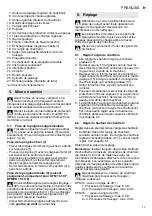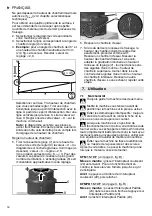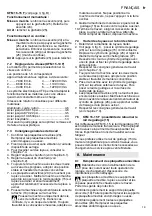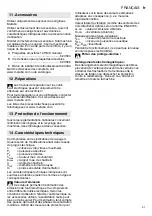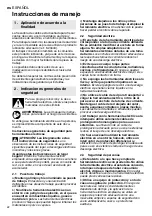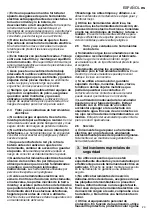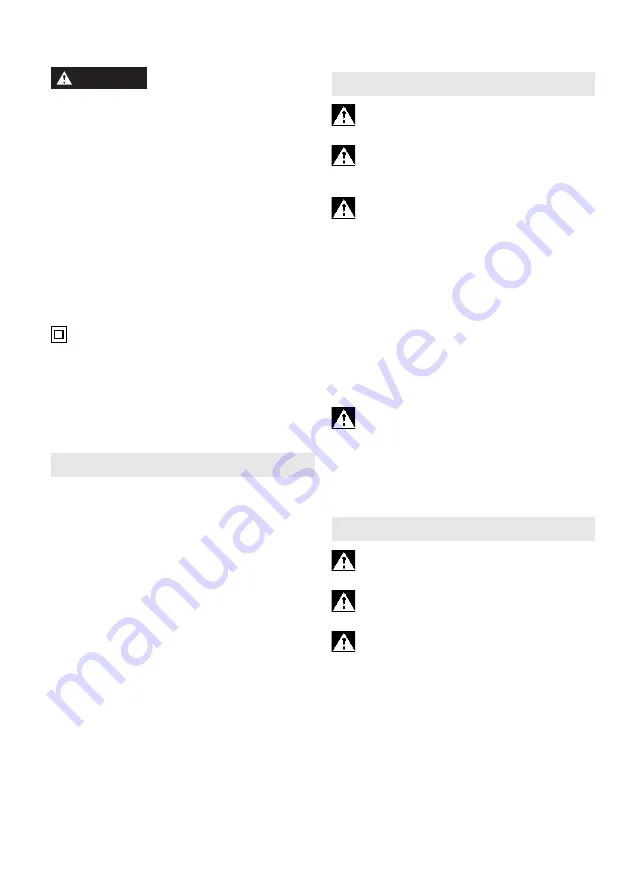
ENGLISH
en
8
Additional Warnings:
California Prop 65 08_2018
Some dust created by power
sanding, sawing, grinding,
drilling, and other construction activities
contains chemicals known to cause cancer,
birth defects or other reproductive harm. Some
examples of these chemicals are:
• Lead from lead-based paints,
• Crystalline silica from bricks and cement and
other masonry products, and
• Arsenic and chromium from chemicallytreated
lumber.
Your risk from these exposures varies, depending
on how often you do this type of work. To reduce
your exposure to these chemicals: work in a well
ventilated area, and work with approved safety
equipment, such as those dust masks that are
specially designed to filter out microscopic
particles.
3.3 Symbols on the tool
...........Class II Construction
V...............volts
A...............amperes
Hz.............hertz
W..............watts
~
..............alternating current
rpm ......... revolutions per minute
.../min ..... revolutions per minute
n ............. rated speed
See pages 2 and 3.
1 Bow handle
2 Locking discs
3 Thumb screws
4 Threaded holes on gear housing
5 Side handle *
6 Scale (chamfer height)
7 Adjusting ring (chamfer height)
8 Clamping screws on scale ring
9 Scale ring (chamfer height)
10 Speed adjustment wheel *
11 Electronic signal indicator *
12 Handle
13 Chip protection plate screws
14 Chip protection plates
15 Guide rail
16 Arrow = prescribed working direction
17 Scale (chamfer angle)
18 Screws (chamfer angle)
19 Indexable insert holder / milling head
20 Indexable insert
21 Fastening screw for indexable insert
22 Slide switch *
23 Paddle switch *
24 Lock *
25 Trigger*
26 Guide roller
27 Scale (pipe diameter)
*equipment-specific
Before commissioning, check that the rated
mains voltage and mains frequency, as stated
on the type plate match your power supply.
Always install an RCD (GFCI) with a maximum
trip current of 30 mA upstream.
5.1 Attaching the additional handle
Only work with attached bow handle (1) or side
handle (5) (depending on equipment)! Attach
the handle as shown (see page 2, Fig. A).
Attach bow handle (1)
- Fit locking discs (2) to the left and right of the
handle (1).
- Move the handle (1) with the locking discs (2) from
the front to the gear housing.
- Insert the thumb screws (3) to the left and right of
the handle (1) and turn gently.
- Adjust the handle (1) to the required angle.
- Firmly tighten the thumb screws (3) to the left and
right manually.
Attach side handle (5) (depending on
equipment, only for KFM 15-10 F,
KFMPB 15-10 F):
When milling edges of small angles (setting <
30°) depending on the working conditions it
may be advantageous to use the side handle (5)
rather than the bow handle (1). For larger angles,
always use the bow handle (1) so that you can hold
the machine securely.
- Attach the side handle (5) on the
right or left
side
Pull the plug out of the socket before making
any adjustments, changing tools, carrying out
maintenance or cleaning.
Indexable inserts, holders for indexable
inserts, the workpiece and chips can be hot
after work. Wear protective gloves.
Danger of crushing! Wear protective gloves.
6.1 Setting the chamfer angle
1. Read the set angle on the scale (17).
2. Loosen the screws (13) and slide both chip
protection plates (14) (on the left and right of the
machine) upwards.
3. Loosen the screws (18) (front and back) and set
the chamfer angle to the desired angle by
turning the guide rail (15). Read the set chamfer
angle on the scale (17).
4. Firmly tighten the screws (18) (front and back).
5. Slide both chip protection plates (14) (on the left
and right of the machine) all the way down.
Tighten the screws (13) (on the left and right of
the machine).
6. Changing the chamfer angle also changes the
chamfer height (due to the design). Therefore,
4. Overview
WARNING
5. Commissioning
6. Setting

















